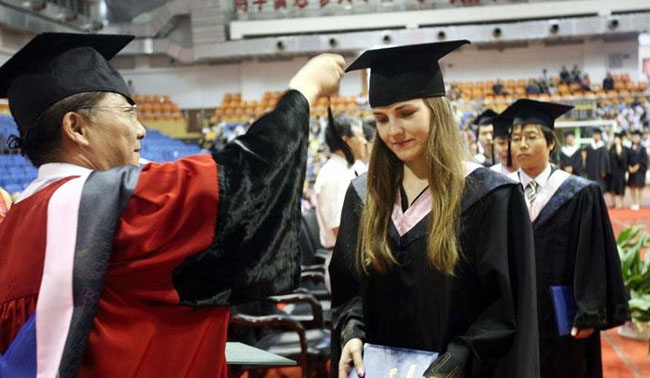China calls for ‘broadly same’ but not ‘completely equal’ rules for foreign and local students
China calls for ‘broadly same’ but not ‘completely equal’ rules for foreign and local students


In the wake of some recent news and debates in regards to preferential policies enjoyed by foreign students in China, the country’s Ministry of Education clarified its position at a press conference last week, saying that it would make further efforts to make sure management and services for Chinese students and overseas students studying in China are “nearly the same” but not “totally identical” given that foreign students come from a different cultural background.
Per an article (in Chinese) published by the People’s Daily on July 20, in a recent press briefing hosted by China’s education authorities, questions posed by media people at the event largely centered on the government’s policies regarding overseas students, especially those who are enrolled in the Chinese higher-education system.
In response to a journalist’s request for an official explanation on the concept of “broadly same management,” which was first introduced by the ministry in a 2018 proposal that addressed its overarching attitudes toward foreign students in China, a spokesperson from the ministry’s international cooperation and communication department stressed that Chinese colleges were required to make sure local students and foreign students enjoy equal learning resources and management services. Schools should also guarantee healthy cultural exchanges between them and protect the rights of both.
To elaborate on the government’s stance, the spokesperson went on saying that rules being “broadly same” doesn’t mean they are “completely equal.” According to the spokesperson, while local and foreign students should be viewed equally for the most part, it’s a matter of fact that foreign students deserve extra and necessary assistance and attention from schools because they are likely to face obstacles in their studies in China due to language barriers and cultural differences. Exceptional treatment offered by Chinese universities, however, should be based on the principles of “rationality, equality, and cautiousness.”
In addition, the spokesperson emphasized the importance of getting foreign students educated about Chinese laws and school rules, saying that overseas students should be properly punished when they violate regulations. And in cases where foreign students are suspected of committing crimes and breaking laws, schools should collaborate with related departments to hold students accountable for their behavior.
When asked about the government’s scholarship program for foreign students in 2018, the spokesperson revealed that there were about 63,000 foreign students who studied in China last year on government-issued scholarships and grants, accounting for almost 12.8 percent of all foreign students in 2018. The spokesperson also said that since China had signed student exchange agreements with more than 180 countries, the country was expecting more overseas students to come and the ministry would strive to “be more selective in offering fellowships” in order to “elevate the quality of foreign students.”
Overseas students receiving exceptionally favorable treatment in China has been a contentious topic for years as local students have complained about feeling treated like “inferior citizens” without access to a whole package of privileges that are only available to their foreign peers. The press conference was held at a moment when the outrage extended to public discourse and reached a fever pitch after news of a series of incidents involving foreign students, such as Shandong University’s controversial study buddy program, which was pairing one foreign student with three Chinese volunteers, as well as the scandal of Capital Normal University (link in Chinese), which was discovered to have reserved its on-campus swimming pool for only foreign students in the summer.






